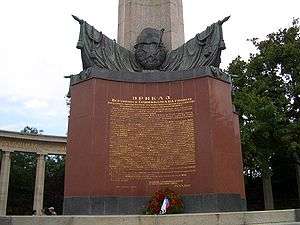Soviet War Memorial (Vienna)
| Soviet War Memorial (Schwarzenbergplatz, Vienna) | |
|---|---|
| Soviet Union/Russia | |
|
Soviet War Memorial in Vienna, Austria | |
| For Soviet war dead of the Vienna Offensive | |
| Unveiled | August 19, 1945 |
| Location | Vienna |
| Designed by | S.G. Yakovlev |
Total commemorated | 17,000 |
|
Eternal Hail to the heroes of the Red Army who fell in battle against the German fascist invaders for the freedom and Independence of the peoples of Europe. | |
The Soviet War Memorial in Vienna, more formally known as the Heldendenkmal der Roten Armee (English: Heroes' Monument of the Red Army) is located at Vienna's Schwarzenbergplatz. The semi-circular white marble colonnade partially enclosing a twelve-metre figure of a Red Army Soldier was unveiled in 1945.[1] The Heroes' Monument of the Red Army in Vienna was built to commemorate 17,000 Soviet soldiers who fell in the Battle for Vienna of World War II.[2]
Background
Near the end of World War II, Soviet forces of the 3rd Ukrainian Front were ordered by Joseph Stalin to capture Vienna, both for strategic military purposes and for use as a post-war bargaining chip with the Allies.[3] After intense urban fighting, Vienna finally fell firmly into Soviet hands on April 14, 1945.[3]
Construction details and Austrian perception
|
|
The creation of an Allied Commission for Austria was envisaged by Allied leaders at the various sessions of the European Advisory Commission and established by the Agreement on control machinery in Austria in London on July 4, 1945. The agreement mandated the creation of four occupation zones (American, British, French and Soviet) in Vienna, similar to Berlin.[4] Perhaps not coincidentally, although several sites were considered for the Soviet memorial, ultimately a prominent location in the 3rd district near the Palais Schwarzenberg was chosen, imposingly within sight of the location used by the four allies to govern Vienna. German prisoners of war and Austrian construction workers were used to build the 3,000-square-foot (280 m2) site.[5]
The memorial includes a triumphal arch and is dominated by the figure of a soldier with a PPSh-41 submachine gun on his chest. The soldier wears a golden helmet and holds a Soviet flag and a golden Soviet coat of arms.[2] The Heldendenkmal der Roten Armee has generally been an unpopular reminder for Viennese of the painful Soviet occupation in the weeks following the war.[2] Russian President Vladimir Putin visited the memorial in 2007 to lay flowers and specifically give thanks to Austria for not demolishing it.[6] The city paid to refurbish the memorial,[7] despite objections from certain members of the local press.[8]
Stone tablet text

The text of the stone tablet in front of the monument begins:
Monument to the soldiers of the Soviet Army, who for the liberation of Austria from fascism have fallen....
See also
- Soviet War Memorial (Treptower Park)
- Soviet War Memorial (Tiergarten)
- Soviet War Memorial (Schönholzer Heide)
- The Motherland Calls
- Memorial to the Murdered Jews of Europe
References
- ↑ (German) Heldendenkmal der Roten Armee, www.nachkriegsjustiz.ag, Retrieved April 3, 2011.
- 1 2 3 Chernov, Sergey, "Austrian Capital Preserves Imperial Ambience", The St. Petersburg Times, January 26, 2010, Retrieved April 3, 2011.
- 1 2 Glantz, David, The Soviet-German War 1941-1945 Clemson University, October 11, 2001. Retrieved April 2, 2011.
- ↑ Grew, Joseph C., Foreign Relations of the United States, 1945, vol. III, May 7, 1945. pp. 116-117
- ↑ Czeike, Felix, Historisches Lexikon Wien, Band 5, Kremayr & Scheriau, Wien 1997, ISBN 3-218-00547-7, page 311.
- ↑ (German) Putin verabschiedet sich, DiePresse.com, May 24, 2007, Retrieved April 3, 2011.
- ↑ (German) 3D-Vermessung des Heldendenkmals der Roten Armee, www.netzundplan.at, (refurbishment contractor), Retrieved April 3, 2011.
- ↑ (German) Mädchenmord und Attentate,Öffentliche Sicherheit, January–February 2006, Retrieved April 3, 2011.
| Wikimedia Commons has media related to Heldendenkmal der Roten Armee. |
Coordinates: 48°11′53.27″N 16°22′34.21″E / 48.1981306°N 16.3761694°E
